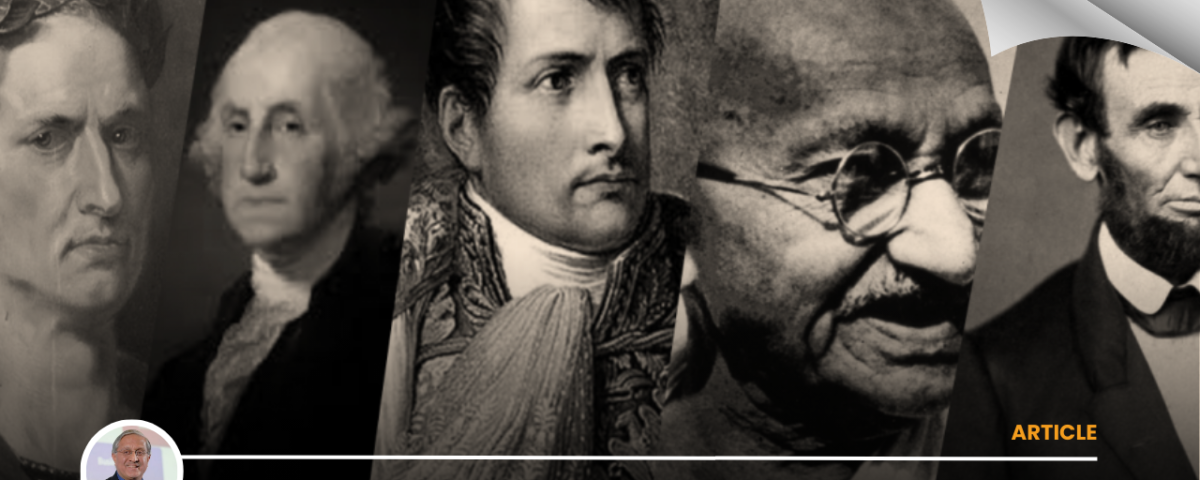To appear on 14-9-22
BS The Wise Leader (56)
How history remembers leaders.
By R. Gopalakrishnan*
*The writer is an author and a business commentator. His articles and videos can be accessed at his website www.themindworks.me and his email ID is rgopal@themindworks.me
To borrow an expression from the New Yorker, “we live in an era that has been profoundly warped by the headstrong impulses of leaders who are technically sophisticated but emotionally immature”. One leadership profile that dominates our times is the ready-to-cook-hero.
Among several ambitions, hard-driving chief executive officers (CEOs) desire to be seen as patron padrone of their times. History should show them in a positive light. As their disruptive ideas successfully flower, sometimes, their approach is perceived to lack empathy: truly valid for all leaders occasionally but for only some persistently. If affection, kindness, and empathy are persistently missing, history is negative.
Impactful and long-remembered leadership requires a convergence of the analytic and the humane. As Shams of Tabriz says in Elif Shafak’s The Forty Rules of Love, “The past is a whirlpool…. time is just an illusion…live in the present moment…everything and everyone in this universe is interconnected. We are all One.”
History does not take kindly to empathy being permanently missing. Leaders are judged in the short-term by their rational accomplishments. What lingers are the qualities of heart. In naval terminology, like a ‘wake’ is left by a ship after navigating the waters, loved leaders leave a positive wake. Uneven or negative wakes are not well-regarded. As JRD Tata had said, “leaders must lead with affection”. The residual effect on people well after the leader has gone should evoke admiration as well as love!
In the Mahabharata battle, the Pandavas fought fiercely against their revered grand-uncle, Bhishma. Towards the end, as the injured Bhishma lay on a bed of arrows in his final moments, they joined his eponymous sermon, Vishnu Sahasra Namam. In the brilliant Sangam-era story, Silappadikaram, the chaste Kannagi cursed that Madurai should burn as retribution for the Pandya king’s injustice to her husband. Thereafter the king committed suicide in shame for his misjudgment.
On a visit to England, I heard the story of Archbishop Thomas Becket. He was brutally murdered in Canterbury Cathedral by four knights, apparently on the orders of King Henry II. The names of the four assassins are not relevant, history records that King Henry II was behind it. Some centuries later, Thomas Cromwell was beheaded on charges of treason and heresy. The name of the executioner is not famous, but King Henry VIII is remembered as the perpetrator.
A century later, Shah Jahan’s eldest son, Dara Shukoh, was eliminated from the succession race by Aurangzeb. Aurangzeb’s forces fought Dara Shukoh’s army at Samugarh, chased him to Bolan Pass, and brought the captured Dara Shukoh back to Delhi. His brutal murder was witnessed and recorded by the traveler, Bernier. The names of the killer(s) are irrelevant, but Aurangzeb is remembered as brutal.
Turning to the corporate sector, Albert Dunlap was known as a turnaround specialist through mass layoffs of workers in 1980s and 1990s. He earned the appellation ‘Chainsaw Al’. Jack Welch is remembered for his disruptive rationalization, cost cutting, and innovation, but also for his ruthlessness with people. He still carries the label of ‘Neutron Jack’. That is how he will be remembered. The media is a powerful force in shaping public opinion.
Chris Viehbacher, erstwhile CEO of Sanofi, implemented his vigorous drive to internationalize the culture of Sanofi. He was sacked dramatically by the all-French Sanofi board. At Citi, Vikram Pandit was thought of highly for his rescue act of the bank, but he was ejected from the CEO slot suddenly.
CEOs and boards must figure out their work plan, the what and the how; each has multiple options. History remembers the how—it can overshadow the what. Efficiency is valued, but effectiveness is remembered. Kindness pays. It is possible that India’s fine economist and prime minister, Dr Manmohan Singh, meant this when he hoped that history would judge his tenure more sympathetically.
As I was writing this column, my thoughts turned to the importance of affectionate leadership when I read the tragic news of the death of former Chairman of Tata Sons died in a road accident recently. I served on two boards with him, initially in Tata Power, and later in Tata Sons. I retired a few months before his own departure. Cyrus was young (54), well-qualified (Engineer, MBA), accomplished and professional (grew family construction business successfully).
He was a fine human being, pleasant, modest, low-profile, and unassuming, unaffected by huge wealth. After assuming executive role, he spent much time, travelling and connecting, analyzing problems, and devising solutions. He was forthright in his thinking and speaking, but never overbearing or imperious. Many managers perceived him as an approachable, affable, incisive modern-day leader, who demonstrated EQ and IQ. The effulgent admiration and praises for Cyrus after his death are noteworthy. The social media has been incredibly rich with stories and messages. Some messages were from those who did not even know him but bore a positive impression of him.
Would he have succeeded? Who knows?
History is a perception of the past; the future is an illusion; the present matters! For sure, Cyrus Mistry was regarded with affection.



